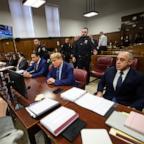Does Assassination Ban Pertain to Saddam?
W A S H I N G T O N, March 16 -- Sixty years ago, deep into World War II, the United States put one of its enemies on a hit list.
Yamamoto was the Japanese admiral who had planned the attack on Pearl Harbor and was considered by his people to be their greatest military commander.
On April 18, 1943, U.S. fighters tracked Yamamoto, traveling in an aircraft, and blew him out of the sky. No one questioned the wisdom of that action.
How different it would be a generation later.
In 1975, a Senate committee exposed the fact that the United States was, again, using a hit list.
It was the Cold War. The Soviets were the clear enemy. But the tactics were sometimes murky. The U.S. government at some point decided it needed to assassinate Soviet allies around the globe. The targets were not military men, but political leaders — Fidel Castro in Cuba and Patrice Lamumba in Congo, among others.
At the time, the policy seemed unwise and immoral to a nation going through a bout of self-loathing. America had just lost a war in Vietnam. A president had just resigned. And the word "assassination" was too painfully real after the killings of President Kennedy, Robert F. Kennedy and Martin Luther King Jr.
America did not want to be a nation that assassinated other people's leaders, even enemies. In 1976, President Gerald Ford signed an executive order banning assassination as a tool of U.S. policy.
Is Terror War Different?
On Sept. 17, 2002, President Bush told America of the war on terror, "This will be a different type of war than we're used to."
In this war, the United States has again become willing to use hit lists, even if the administration does not like to use the term "assassination."
The first concrete sign of this came in November. The United States tracked an al Qaeda leader, Qaed Senyan al-Harthi. And when it learned that he was in a car crossing a stretch of desert in Yemen, the CIA sent a missile into the car, killing him and five associates, one of whom was a U.S. citizen.
It's the Yamamoto treatment of 60 years ago, updated for this different kind of war that the president has talked about. It is not a declared war.
Al-Harthi wasn't wearing a uniform, but he was an enemy responsible for violent acts against the United States, the government said, claiming he helped to plan the attack on the USS Cole that killed 17 American service people.
Though Yemen approved the operation, moral objections were raised elsewhere. The Swedish foreign minister called the Yemeni attack "a summary execution that violates human rights."




